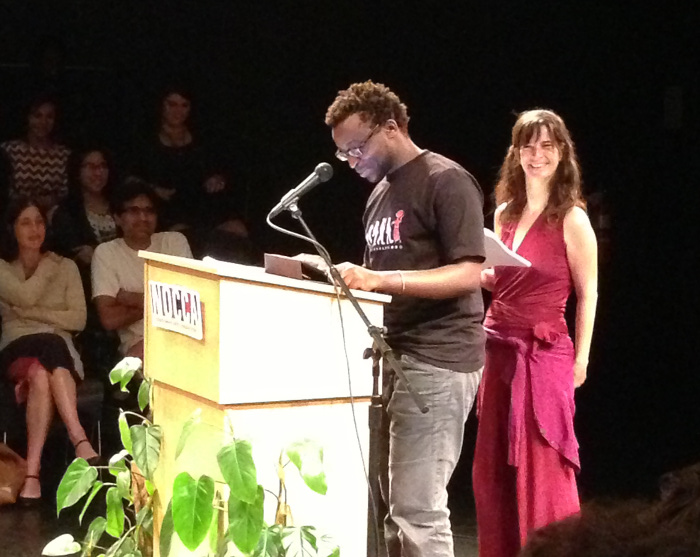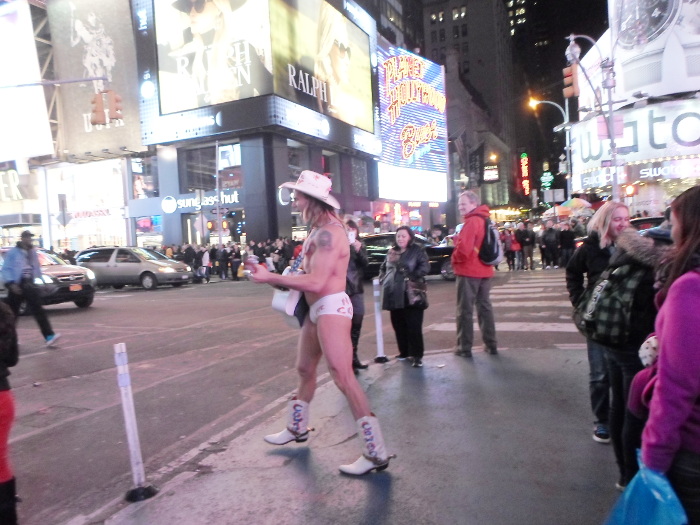The Burundian author and journalist Roland Rugero was the guest of the prestigious International Writing Program (IWP), at Iowa University, from August 24th to November 13th. Between reading, writing and meeting 33 other writers and travelers, he tells us about his journey. – Text translated by Joanna K. Ndanga and edited by Lakiesha Carr.

Roland Rugero, during a public reading at New Orleans Creative Arts Center (Photo©E.Volk)
In the basement of the State Department were 34 writers all coming from different countries. The group, gathered as guests in Washington DC (American’s capital city), were all new additions to the 1400 former IWP writers who have participated over the 46 years the program has been in existence. It was a unique opportunity, to be sure.
We were curious. As curious as we would later find ourselves in San Francisco, then in New Orleans, Chicago, and finally New York. Keeping all the senses wide open: that’s where writing stems from.
But in that moment, inside the air-conditioned room, the Star Spangled Banner flag stared at us from behind the podium where Mrs. Evan Ryan – John Kerry’s Deputy Secretary – congratulated us with a smile on her face : “I heard you have been enjoying your stay here, she said. “You certainly are the best way to do what we do, i.e. creating bridges and reinforcing communication between peoples,” she explained. The glances my cohort exchanged around me were attentive, their faces seemingly unfazed by her words : “As writers, you will be able to explain the USA to your fellow citizens. Maybe you have learned something here that will be useful to your communities.”
I, however, found myself smiling on the inside, both amused and anxious : what will I possibly “tell Burundians” so they can “understand the USA ”? (By the way, I was a little sad that there were no American writers who might experience the same adventure in Burundi, to carry out my mission in a foreign place in a reversed scenario.)
What might I tell my fellow Burundians of the United States when I spent ten weeks mostly residing in one of the quietest towns in the entire country ? Indeed, I was asked while on the Amsterdam-Detroit flight, the plane with which I landed on the American soil for the very first time, “Why are you heading to Iowa City? It’s in the middle of nowhere! There’s nothing but cornfields!” Luckily enough, the beauty and tranquility of the place warded off what at the time felt like a bad omen.
Congo Square : for years, a century and a half ago, this place in New Orleans was the only place in the USA where the black slaves were allowedto meet… it was an opportunity to celebrate their cultures, danse, sing…(Photo©R.Roland)Still the question remained: how do I speak of another continent without falling prey to clichés; the same sort of clichés our colleagues from the other side of the Atlantic are so often guilty of making when talking about we, Africans? How should I proceed with nothing but a ten-weeks-long stay to help me? Is it enough? No! Especially when tasked with something as momentous as discovering a country, another culture altogether.
So I decided I should simply take notes of things that touched me the most during my stay. Like, for instance, the fact that most people did not know where Burundi is located. Nor about our sacred drums. There comes a time when inevitably you have to explain that you are coming from a country near Rwanda. Aaaah! Now I see… the genocide of 1994 was awful, wasn’t it? Once that awkward moment has passed, you realize, with some relief, that truly you are all in the same boat. It should seem obvious that, in the collective imagination, the average American would know all the countries in the world, at least just as much as the Pentagon strategists do.
It is only while traveling the immensity of the country that you realize how peacefully one can live without thinking much about what is happening in the rest of the world. With a credit or debit card, you place a mere order and get everything without leaving the comforts of home. That feeling of self-sufficiency is found elsewhere in numerous conversations where the USA is “the model”, a truth candidly and faithfully made absolute.
I will always remember the church service at Times Square Church, located a street away from the famous Broadway theater district. Carter Conlon, the pastor, explained that “as announced by the Bible, soon, brothers and sisters in Christ, soon the USA will be the laughingstock of the world!”
With an emotional tone, he evoked the time when his country “represented something exceptional in the world. It used to make sense when we identified ourselves as American: it meant values; it meant that we were on the good side, the side of the ones suffering,” he added. “Alas, we aren’t anymore!”
That feeling of being the gravitational center of the world needs fodder; a fodder represented by immigrants (including Black slaves) who have been providing most of the elbow grease necessary to build, in less than four centuries, the majority of what we see.
The country is therefore attractive because people are advertising its dream : the one that will be achieved if you work there. Work hard, accomplish your dreams, live your freedom! Nevermore was this sentiment felt than on the long, endless roads that I traveled.
With the vastness of the country, one would expect the railway to be one of the most developed means of transportation. But all the people to whom I asked the question were decisive, “Americans prefer having their own cars. We like to be independent, go where we want whenever we like…”

Naked, wearing a cowboy costume with 2° C outside, this showman has a simple objective in the urban jungle of Mew-York, on Broadway : survive (Photo©Nebo)
And it’s in the name of that so-called almighty individual freedom, written within the very first sentences of the Constitution, that we witnessed, even from afar, the fight against Obamacare, the Barack Obama law that aims to give health insurance to Americans. A law that, in other places, would seem to be an obvious necessity. Here, “even some poor Americans without any health insurance are against it!” people explained to me. Well, go figure …
The USA’s magnetic properties it exercises on the rest of the world is not only present in the powerful media but also throughout the country’s universities. Academic researchers, professors, students and writers all come from different parts of the world to benefit from the enormous mass of knowledge the American libraries (and the laboratories) hold. For instance, we were the guests of the University of Iowa, a public institution, which has 5.3 millions of books. “It’s not even that big!”, people murmured while walking the library’s hallways.
My heart tightened when I thought of Burundi.
But, the trip also had its moments of great surprise too. Those rare times when I ran into fellow Burundians provided the most pleasant of them all.
For instance, I would be remiss if I failed to mention Mama Happy ! I met her on the bus to Chicago; she was reprimanding her 3-year-old turbulent son in Kirundi. We hugged as if we’d always known each other. She introduced me to her mother, a refugee from 1972 who hadn’t seen the motherland ever since. We laughed; I was happy and savoring that incredible moment of exchange in the motherland tongue with a family that hasn’t been in Burundi in 40 years. And Mama Happy, born in exile, was told me: “But there’s a lot of Burundians in the USA especially when you go in Houston, Texas, and in Portland, Maine.”
She continued: “We are here since 2008, we were a little over 10,000, all coming from the Tanzanian camps.” With a smile, she looked straight in my eyes and said, “Since then, we are American citizens.”



















 IWACU Open Data
IWACU Open Data

